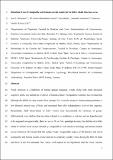Imitation of novel conspecific and human speech sounds in the killer whale (Orcinus orca)
Abstract
Vocal imitation is a hallmark of human spoken language, which, along with other advanced cognitive skills, has fuelled the evolution of human culture. Comparative evidence has revealed that although the ability to copy sounds from conspecifics is mostly uniquely human among primates, a few distantly related taxa of birds and mammals have also independently evolved this capacity. Remarkably, field observations of killer whales have documented the existence of group-differentiated vocal dialects that are often referred to as traditions or cultures and are hypothesized to be acquired non-genetically. Here we use a -Do as I do- paradigm to study the abilities of a killer whale to imitate novel sounds uttered by conspecific (vocal imitative learning) and human models (vocal mimicry). We found that the subject made recognizable copies of all familiar and novel conspecific and human sounds tested and did so relatively quickly (most during the first 10 trials and three in the first attempt). Our results lend support to the hypothesis that the vocal variants observed in natural populations of this species can be socially learned by imitation. The capacity for vocal imitation shown in this study may scaffold the natural vocal traditions of killer whales in the wild.
Citation
Abramson , J Z , Hernández-Lloreda , V , García , L , Colmenares , F , Aboitiz , F & Call , J 2018 , ' Imitation of novel conspecific and human speech sounds in the killer whale ( Orcinus orca ) ' , Proceedings of the Royal Society B: Biological Sciences , vol. 285 , no. 1871 . https://doi.org/10.1098/rspb.2017.2171
Publication
Proceedings of the Royal Society B: Biological Sciences
Status
Peer reviewed
ISSN
0962-8452Type
Journal article
Description
This project was conducted at the Marineland Aquarium Antibes, France and supported by a Postdoctoral Scholarship FONDECYT Nº 3140580 to J.Z. Abramson. This study was partly funded by project grants PSI2011-29016-C02-01, PSI2014-51890-C2-1-P (MINECO, Spain) and UCM-BSCH GR3/14-940813 (Universidad Complutense de Madrid y Banco Santander Central Hispano) to F. Colmenares.Collections
Items in the St Andrews Research Repository are protected by copyright, with all rights reserved, unless otherwise indicated.

